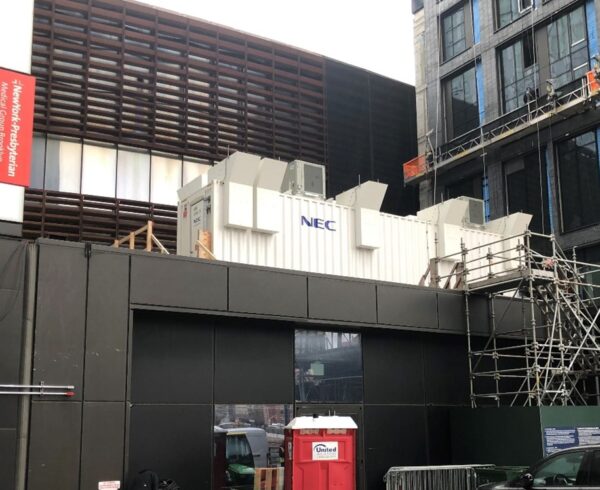The demand for battery energy storage systems (BESS) has been increasing at a rapid rate. Battery energy storage systems reduce environmental impacts, improve reliability and resilience and also save on costs for a building over the life of a system. Due to the surge in popularity we have seen a large influx in requests to provide these systems in New York City. Designing and installing a battery energy storage system is a complex endeavor that requires compliance with specific codes and reviews by NYC Authorities to ensure the safety of both building occupants and the responding emergency services. When a battery energy storage system fails it’s important to have multiple safeguards in place to avoid a catastrophic outcome.
Whether you’re just beginning to look into the potential for a battery energy storage system at your location, or you’re stuck somewhere in the design and approvals process with the New York City Department of Buildings or New York City Fire Department, the following information will be helpful to you. It’s intended to guide you through the general process and potential challenges you’ll experience. If you have a project that you’d like our thoughts on based on something you’ve read, we’re here to help.
What’s Allowed? Battery Energy Storage Systems
The typical codes of record do not cover requirements for battery energy storage systems and in NYC specifically, RCNY 608-01[1] sets the minimum requirements. This rule governs the code requirements for the design and installation of outdoor stationary battery energy storage systems. Currently, indoor battery energy storage systems are not permitted by the City of New York without requesting a variance. The code development process is underway to implement a code to allow for the installation of battery energy storage systems inside of buildings.[2]
How Can You Obtain Permission? FDNY Certificate of Approval
Prior to installing a battery energy storage system, be sure that the manufacturer of the system has approval from the New York City Fire Department to be used in New York City. This process requires a significant amount of information to be provided to the NYC authorities, which may include hazard calculations, system narratives and listings in accordance with UL9540 and UL9540A test reports. It is extremely helpful to ensure you have technical assistance during this process to discuss challenges that arise.
How Should It Be Protected? Fire Detection and Fire Suppression Systems
RCNY 608-01 provides requirements for various fire suppression and detection systems as well as other fire protection related systems that are required for the battery energy storage system depending upon the type of system, size of the system, the container used for the storage of the batteries and those utilized in the required listing testing. Suppression systems, such as water spray systems and clean agent suppression systems, are provided for the containers in addition to smoke detection. In certain instances flame detection and/or gas detection systems are also required. Plans for the systems are required to be filed with the New York City Department of Buildings or New York City Fire Department, as appropriate, for plan review and approval. Ultimately the systems will be inspected by the respective agencies in order to obtain final approval of those filings.
Compilation of Systems and Safeguards – OTCR Peer Review
Part of the filing and approval process with the New York City Department of Buildings OTCR (Office of Technical Certification and Research) requires a peer review be performed by a licensed fire protection engineer with relative ESS experience to confirm compliance with all of the applicable New York City codes for the battery energy storage system. The peer review is one of the final steps prior to receiving a Conditional Acceptance Letter (CAL) from OTCR for the battery energy storage system.
What if It’s Near Other Buildings? Exposure Analysis and Modeling
Some projects have been designed where the battery energy storage systems are located close to adjacent buildings. In the event of a thermal runaway event and deflagration vent activation, it’s possible for the adjacent buildings to be exposed to the products of combustion. In these instances, a Computational Fluid Dynamics (CFD) model (fire model) can be prepared to show the effects of the potential fire on the nearby buildings.
How We Can Help
Sparc fire protection can provide all of these services for your project. We are familiar with the applicable codes for battery energy storage systems as well as the design requirements for the fire protection, fire suppression and fire detection systems. Sparc also has licensed fire protection engineers to perform the fire models and peer reviews of the battery energy storage systems for New York City Department of Buildings OTCR and the New York City Fire Department. Sparc has provided these services for a number of BESS projects in New York City. Please do not hesitate to contact us if we can help provide guidance on your project.



Leave a Comment